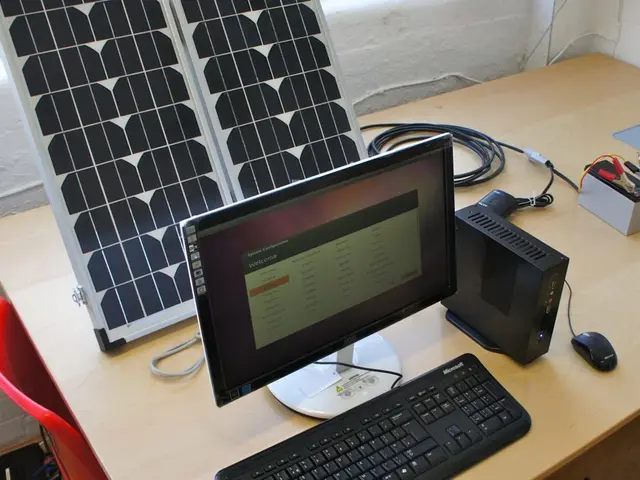Solar Energy Growth Slows Down: Key Factors at Play
Solar expansion remains at a moderately sluggish pace
While the solar energy market is poised for continued growth in the coming years, it's anticipated to do so at a slower pace compared to previous record years. Here's the scoop on the factors causing this deceleration:
Policy Uncertainty and Regulatory Changes
- Policy Shifts in Major Markets: Fickle solar policies in prominent markets, such as the U.S. and China, are raising uncertainty for investors. For instance, confusion over the future of the U.S.'s Inflation Reduction Act (IRA) and renewable energy tax credits has triggered a decline in investment and financing for solar projects, making it tough for investors to foresee potential returns and seal long-term deals.
- EU Policy Gaps: In the European Union, inadequate implementation of effective sustainable energy policies at the member state level may even trigger a market contraction, adding to volatility.
Economic and Market Factors
- Overcapacity and Price Pressure: The global PV industry is grappling with substantial overcapacity in manufacturing, particularly in China and Europe, leading to record-high module stocks. This surplus has caused a sustained drop in module prices, forcing manufacturers to struggle with cash flow. Although lower prices have sparked demand in certain markets, they've also made profits elusive for producers.
- Declining Investment: Corporate financing for global solar firms dropped by 41% year-on-year in Q1 2025, mirroring a broader investment pullback due to economic and policy uncertainties.
Technical and Infrastructure Challenges
- Grid Limitations: Many regions face constraints related to grid infrastructure, impairing their ability to absorb new solar capacity and causing development delays.
- Curtailment and Losses: In specific markets, such as Brazil, excessive solar curtailment (an average of 17.1% over the past year) has increased the perceived risk of new projects, leading to delayed investments and a further slowdown in growth.
Labor and Supply Chain Issues
- Labor Shortages: Shortages of skilled labor can hamper installation and construction, slowing the rate at which new projects come online.
- Supply Chain Disruptions: Ongoing disruptions, along with tariffs and trade restrictions, add complexity and risk to project planning and execution.
In summary, even though the underlying foundations for solar growth remain robust, these interlinked challenges are reining in the acceleration of expansion in the global solar market. [Sources: ntv.de, dpa][1][2][5]
Enrichment Insights:
- Policy Uncertainty and Regulatory Changes: Solar investment and financing declined due to ambiguity over the IRA and renewable energy tax credits in the U.S. In the EU, inefficient policy frameworks at the member-state level could cause market contraction and volatility.
- Overcapacity and Price Pressure: The global PV industry is faced with significant overcapacity in manufacturing, most notably in China and Europe, leading to record-high module stocks and a subsequent drop in module prices. Lower prices have stimulated demand in certain markets but have also made profitability challenging for producers.
- Grid Limitations: Grid infrastructure constraints prevent many regions from absorbing new solar capacity and cause development delays. Brazil experiences high levels of solar curtailment (17.1% on average over the past year), increasing the perceived risk of new projects, leading to postponed investments and growth slowdown.
- Labor Shortages: Skilled labor shortages hinder installation and construction, thereby delaying the onset of new projects.
- Supply Chain Disruptions: Continuous disruptions, along with tariffs and trade restrictions, add complexity and risk to solar project planning and execution.
- The Commission has also estimated that the slowdown in solar energy growth could significantly impact the environmental-science industry, particularly in terms of reduced carbon emission reductions.
- In light of these challenges, some solar energy experts are suggesting investments in research and development for advanced solar technologies, such as concentrating solar power and solar thermal energy storage, to improve efficiency and reduce reliance on traditional solar PV installations.
- The finance industry recognizes that there's a need for innovative financing solutions to support the growth of the solar energy sector, such as green bonds, impact investing, and energy derivatives, to attract the necessary capital for nurturing long-term solar development.
- Whatsapp groups and online platforms for solar energy enthusiasts and professionals have emerged as useful resources for sharing knowledge, resources, and solutions to address the challenges faced by the solar energy industry, fostering a sense of cooperation and resilience.
- Solar energy research and collaboration between the solar, science, and finance industries are critical for driving innovation, overcoming challenges, and securing a sustainable future for the solar energy sector that benefits both the economy and the environment.







